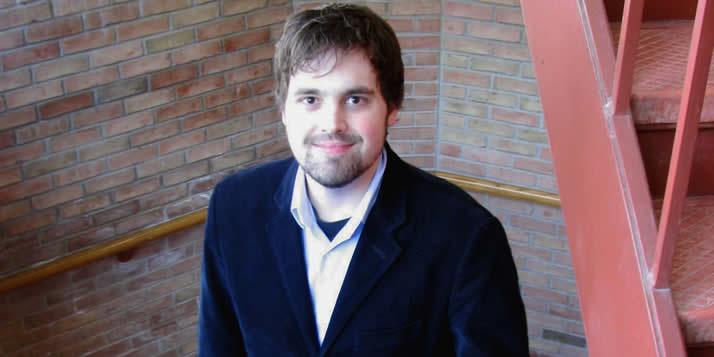Halteman's journey extends to Oxford

As a fellow of the Oxford enterprise, Halteman hopes to continue raising awareness about farm animals, particularly those raised in factory farm settings.
Susan was very influential in Matthew Halteman’s metamorphosis into an animal compassion advocate, but then, so were Gus and Charlie. Susan is Halteman’s wife; Gus and Charlie are their dogs.
A Calvin professor of philosophy, a vegan and, in recent years, the originator of lecture series, booklets and vegan chili cook-offs, Halteman was not recruited to the cause purely through emotional appeals, however.
Mind and emotions
“It really was kind of a one-two punch of reason and the sentiments that brought the whole big picture together,” summed up Halteman, who last month was elected to the Oxford Centre for Animal Ethics (OCAE), an elite think tank of animal compassion scholars.
Halteman was first schooled about his eating habits as part of his Mennonite upbringing: “I was always aware of the connections between food and social justice,” he said, “because the Mennonites have this great series of cookbooks that are all about eating low on the food chain and being aware of what people in the global south were eating,” he said.
Greening his palate
It was when he came to Calvin in 2004, Halteman said, that he became aware of the wider universe of creation care. And in 2005, a friend challenged him for the first time about animal compassion. “He said to me, ‘If you want to talk about being green, take a hard look at what’s on your plate and then come back and talk about being green,’” Halteman recounted.
The friend urged him to teach a course on animal compassion. “I said, ‘If you send me materials, I’ll cancel the interim I’m about to teach and teach on that instead,’” Halteman said. He first taught “A Peaceable Kingdom,” during Calvin’s 2005 January interim. “My secret aim in teaching it was to come up with 10 knock-down, drag-out arguments to silence his challenge and justify the way I was eating and living.”
A reluctant convert
Instead, Halteman became a convert, albeit a somewhat reluctant one. It was Susan, he admitted, who pushed him into a deeper commitment to animal issues “She’s kind of a person who always had a special connection to animals and forced me to think about what kinds of creatures animals were,” he said. His new commitment included a vegan diet. “She really loved the culinary challenge,” he added.
Gus and Charlie
His new lifestyle also included Gus and Charlie. The former, a bulldog, came into the family (again, through Susan’s persuasion) in 2003. “Gus really played a key role in helping me to see animals as unique individuals,” Halteman said. Charlie, a Lhasa Apso, arrived last summer. “We found him in June, wandering around in 90-degree heat, looking like the last rose of summer,” he said.
Over the last four years, Halteman’s advocacy for animals has taken many forms: a January interim class, a student organization, a conference, a lecture series and, most recently, a booklet for the Humane Society of the United States.
International fellow
Now Halteman will have to adjust his schedule to accommodate a new commitment. Last month he was selected as one of 26 new fellows of the OCAE. The center, founded in 2006, is an international think tank whose aim is “enhancing the ethical status of animals through academic research, teaching and publication.”
Invitation only
Membership in the organization, which is by invitation or nomination only, is offered once to an individual in his or her lifetime
“Professor Halteman is a fine scholar, and we are delighted to welcome him to our prestigious fellowship,” said the director of the center, Rev. Dr. Andrew Linzey. “Only fraction of those nominated are selected.”
The new fellow returned the compliment: “Without question, the Rev. Dr. Andrew Linzey is the leading Christian voice in the field of animal ethics. His pioneering work in the theology of the human-animal relationship is a key source of inspiration and motivation for my own project,” he said.
Changing perceptions
The center’s mission, said Halteman, is a good fit with his. It says: “Heretofore the treatment of animals and the place of animals in the grand scheme of things have been viewed as issues of marginal significance. And part of what the Oxford Centre for Animal Ethics is trying to do is change the public perception of those matters.”
As a fellow of the center, Halteman is eligible to participate in OCAE conferences, events, research, publishing and networking opportunities. He is also welcome to use the center as a home base for sabbatical research.
Halteman is gratified, and not a little daunted, both by the honor and the scholarly company in which he finds himself: “I'm squarely in the newcomer camp, obviously, so I feel like I've got some serious work to do to make good on this vote of confidence,” he said.
Focus on the farm
As a fellow of the Oxford enterprise, Halteman hopes to continue raising awareness about farm animals, particularly those raised in factory farm settings. These creatures, he proposes, deserve the same consideration as do Gus or Charlie. “Because we perceive them differently than our companion animals they tend to fall outside our circle of compassion,” he said.
Halteman also hopes to bring the ecumenical approach he has long brought to bear on animal compassion issues into the international discussion. “I see my work as a way of trying to open a dialogue rather than a my-way-or-the-highway kind of perspective,” he said, “a dialogue between people who work on these ideas and people who are called to agriculture.”






